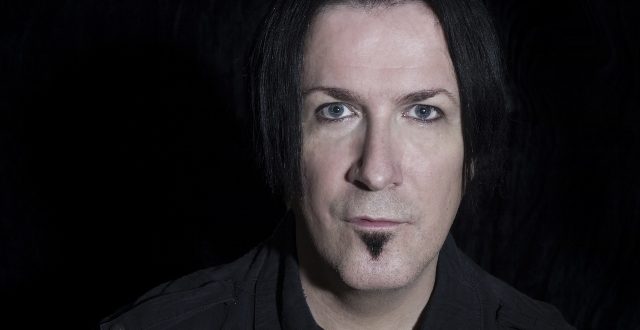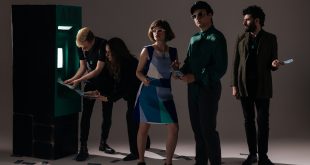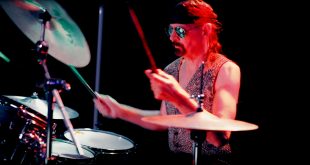In the late 70s, a teenaged Mark Gemini Thwaite immersed himself into England’s two era-defining musical realms: heavy metal and punk rock—the latter of which peaked in popularity. But come the early to mid 80s, Thwaite, by then a prominent multi-genre guitarist, catalyzed a career overseeing the very best of collaborative efforts. As the decades wore on, any part of his resume came to include a diverse range of stints—from grunger Alanis Morisette, to rappers Wu-Tang Clan, to Al Jourgensen of Ministry—and even that’s not the tenth of it.
Under the name MGT, with over 30 years and 20 albums to his credit, the currently US-based Thwaite will not slow down. He’s still thriving in a groove of constant craft, just as he was during his formative years in Birmingham. In fact, he had just completed his debut solo album, Volumes, which is slated for release on June 24.
After listening to the new album, I could say it serves as a worthy adversary in keeping rock ‘n’ roll’s flame alive and well. Indeed, with its showcasing talented guest vocalists from both longstanding and up-and-coming bands, it is a milestone to be proud of. In support of the album, I had the opportunity to speak with Mark and it was well worth it. Several topics were brought into perspective; particularly, the eventual freedom from genre association, recognizing friendship over perceived industry standards, and perhaps the most notable—the surprising cohesiveness of Volumes, especially given its largely pre-planned recording process.
ME: You’ve been pursuing music professionally for well over three decades. Congratulations on that!
MGT: Yeah man, cheers!
ME: Would you say that simply picking up your guitar, and consistently writing new ideas, even if challenging, is what kept you going all this time?
MGT: Yeah! I think you kind of develop a love affair with the guitar. I end up invariably missing it when I’m away from it too long, say when I go on vacation or something like that. Bringing your guitar with you is so easy, but you wouldn’t on vacation. And then I end up really looking forward to getting back to it and strumming away.
Being creative is quite a challenge. You go through phases where you’re quite inspired and just keep coming up with these great ideas—you know, chord sequences and riffs. Then you go through phases where you don’t feel inspired at all, and you start to question yourself. I think it’s just a natural ebb and flow of any musician. You can’t be expected to non-stop come up with fantastic ideas all the time, so I just go with it.
I was going through a prolific writing period right before I did my solo album. It just seemed like a good idea. Finally, after 30 years of playing for other people in various shapes and forms, I thought “I’m not a singer, but I’ll just get some of my friends to sing on my songs!” and the result was Volumes.
ME: Much of your endeavors have been in gothic rock. Were those characteristics what resonated with you the most, especially as you were finding your sound early on?
MGT: I’ve played for a few seminal goth rock artists such as The Mission—also known as ‘The Mission UK’ here in the States—and Peter Murphy of Bauhaus. Before that I was in a band called Spear of Destiny, and I did a tour with Theatre of Hate. It’s kind of like this long association with gothic rock acts
But what I first got into in the late 70s…when I was like 15, I was listening to a lot of New Wave of British Heavy Metal and punk rock. Punk rock was pretty popular in the UK. Bands like Generation X, The Skids, The Clash, and The Sex Pistols would be in the top 20 in the UK, so we all got exposed to them. It was really mainstream punk rock back then.
So I grew up on all that stuff—metal and punk rock, and then as my musical tastes became more developed, I started listening to Bauhaus and Killing Joke—darker alternative sounding bands like that. I think once I’ve done stuff with Spear of Destiny, I was definitely lumped in with that whole alternative UK rock scene.
Getting the gig with The Mission, they actually advertised—in NME and Melody Maker—for a new guitarist. I applied along with thousands of other guitarists (laughs)! And I got the gig after a shortlisted audition. I guess it helped that I had Spear of Destiny on my resume.
ME: So you’re between new wave and punk.
MGT: Yeah! It fairly varies. Nowadays I listen to everything. I find my musical tastes are becoming broader as I get older. When you’re young, you have this splintered view of what you could be into. But I realized as you get older that pigeonholes don’t really matter. I wouldn’t be interested in reggae and country music back when I was 20, but now I can totally be listening to both of those genres, you know? I just open up as I get older.
ME: Now onto Volumes, your first solo album. I feel each of the tracks encompasses a unique diversity that’s brought out by each of the guest vocalists. Can you tell me a bit about how you got this together, and how you implemented your ideas to suit the style of each vocalist?
MGT: The whole process was [actually] very haphazard. It was a combination of my amassing the demos over the years that I’ve recorded in my home studio. Usually I’ll come up with a chord sequence or guitar riff. Then I’ll lay down a programmed drum beat, put on a bass line, and before you know it, I’ll have fleshed out an intro, verse, chorus, and that kind of thing.
For the last 10 years, I was playing with Peter Murphy’s band, and before that, The Mission. I would write stuff that might suit the artist, but I’d also write stuff that maybe wouldn’t suit that artist at all. I would end up just stockpiling these demos, because I wasn’t a singer and didn’t like my voice. I would sit on them; just stockpile them as I did. You know how you hear Prince has got a vault of like, a hundred albums of material (laughs)? I’d have a small, slowly growing stash of demos that were fairly fully realized except for a vocal. Some of them may have been done for, say, Peter Murphy, or with The Mission in mind. I’d send them for whenever we were doing a new album and for whatever reason, they wouldn’t get used.
When I finally decided to do the solo album, I started off by sending out demos I already had, rather than writing from scratch. They were varied in musical style—all in the alternative rock camp, but some would be gothier. People have said that some of it had touches of country, like the acoustic songs. I’d send [the singers] two or three different demos, cause I wouldn’t be able to second guess which songs [they] would use. I’d be like “Hey, here’s these three demos. Pick your favorite one and sing on it if you’re into to it, or sing on all three if you’d like.” I wouldn’t set any grounds.
In some cases, some of the singers did sing on all three. Like Miles Hunt from The Wonderstuff banged out all three demos. In the case of Wayne [Hussey] from The Mission…he only had time to focus on one…”Another Snake in the Grass”. That song had originally been written for a completely different singer in mind…Raymond Watts…of a band called PIG, and it was a much more electronic rock kind of affair. It never happened with PIG, and then Wayne responded to that demo, so he sang on that one.
Most of the songs I’ve written before any of the singers were approached. There were a few exceptions. There’s a song [“Drive and Forget”] with Ricky Warwick from Thin Lizzy and Black Star Riders. That one I did kind of write with him in mind; I came up with the acoustic thing. He’s actually one of the only singers that came into my studio since we both live in Los Angeles, whereas most of the singers live all over the world, so there’s a file sharing kind of thing as well. The other song, “Seconds,” which had Saffron from Republica, was a remake of a Human League song and I did that with her in mind. We started it many years ago and we re-recorded it for this album. The ABBA cover [“Knowing Me Knowing You”] I pretty much had Ville Valo in mind.
ME: Initially you were hesitant to do a solo album, because it seems like a lot of guitarists are expected to showcase this almost plethoric lead guitar virtuosity, in the vein of Yngvie [Malmsteen] and Steve Vai. Would you say you’re more of a melodic player with riffs and textures, and that might have been more efficient?
MGT: Yeah, you pretty much nailed it there. I can do lead guitar, but usually with writing music, lead guitar is the last thing on my mind. I try to come up with a really cool chord sequence. I think Jimmy Page and Robert Smith—they both write chord sequences for their bands. I can’t imagine Jimmy Page writing a song purely to throw a guitar solo in there. You can imagine he puts in a solo as kind of like an afterthought to complement the song.
That’s kind of what I would do. I would write chord sequences that I’d dig, and try to write stuff for singers I’m working with. Quite often, if you look at my album, [it’s] pretty slim in terms of guitar solos. I’m not gonna throw in a guitar solo just for the hell of it; that’s certainly the way I am. So I guess I’m more of…
ME: A chord-based player?
MGT: Yeah. I wouldn’t consider myself a songwriter though, because I always leave the vocal melodies and the lyrics to the singer. The same way Jimmy Page probably does. But I am some kind of writer for sure, because I’m more interested in the chords and the groove—the ultimate singing together and coming together—and I’m not worried about lead guitar until later on.
ME: At that point you realized it’s not about solos; it’s about friends making an album together
MGT: I think so. Maybe with guys like Steve Vai and Joe Satriani—they’re pretty much known for their virtuosity and technique. I think they feel the pressure like they better knock one out of the park, whereas I don’t feel any of that, you know? No one’s lauding me to be the next Van Halen.
ME: Yup, it’s just you and your friends.
MGT: Yeah! For me, it’s me with my friends, and the reason I’ve never done a solo album before was because I thought that was territory for flashy star players like that. It wasn’t until I did a collaboration with Primitive Race—various musicians from other bands. I ended up mixing about half the album. Singers were sending in their vocal parts from all over the place, and I suddenly realized, “Oh, I can do this for my own solo thing!” And you know what? After 20 albums on other people’s records I thought, “It’d be nice before I get run over by a bus tomorrow, to get one record out there with my name on it,” and I’ll just get a bunch of my mates to sing on it.
I did do one instrumental, which didn’t even make it on the album, because so many people ended up contributing and the album was getting a bit long—it’s still 14 tracks. I had to leave two or three tracks off the album. The instrumental was one of ‘em and I did it purely because I thought, “Oh, that’s kind of what would be expected on a guitar player’s album” (laughs), at least one track where they showcase themselves. It’s actually an acoustic-based track called “Epitaph”. The label has it and if they want to include it in the release, they can.
ME: What I gather from Volumes is that it’s friends—old and new—working to build upon each other’s points of view. They build a big collaborative impact, and by doing so, they speak volumes. Was that kind of what you were going for?
MGT: Yeah, pretty much! I can tell you that none of the singers heard what the others were working on; they were all working in their own little bubble. They’re in a bubble deliberately so that they don’t start pre-meditating on what the others will do.
I didn’t want Wayne Hussey to hear what Miles Hunt was doing and think “I should sing more like ‘this’”, or “I should sing with ‘this’ track instead of ‘this one’”. I made it like “Look, they’re all in a bubble, they’re not hearing what each other is singing on, so that everything comes naturally and instinctively to them”. They just gravitate toward the songs, the vocal style and the approach that they like.
The fact that it all hangs together is kind of surprising. Obviously you’d imagine an album with 14 different tracks and 10 different singers, and expect it to sound quite loose. But for some bizarre reason it all hangs together really well. The only thing I can think of is that the mixes originated from me in my home studio, so I’m the consistent factor. The music is the consistent factor; it’s just the vocal that changes.
ME: How do you think your musicianship has grown as a result of this particular collaboration? Is there always room to expand?
MGT: Oh yeah, there’s always room to learn! There’s so many styles of guitar and music that I still need to explore, you know? But I still live within the alternative rock ‘n’ roll world, styles, and what I apply. Working on Volumes, it certainly opened my eyes in that you don’t necessarily need to worry about consistency or a style. Like you get these bands that put out an album, and it has to sound like that band—AC/DC, the Scorpions, something like that. My album’s really varied and it runs from goth rock, to country tinged rock ‘n’ roll, to mainstream pop music in some cases, and it still hangs together. I guess good materials win—good songs, good writing, good performances…
ME: In general, by showcasing the styles of these artists you’ve collaborated with, do you encourage fans to learn more about them?
MGT: Well I also wanted anyone checking out my work, and my album, to check out the singers I’ve involved. I’ve involved singers that I really liked. That’s why you’ve got singers like Ashton Nyte, Carlo van Putten and Erica Nockalls, as well as the bigger names like Wayne Hussey, Miles Hunt and Julianne Regan. I’ve included the newcomers because I wanted people to be introduced to these great singers and what they have to offer.
ME: I know this is the big cliché to end the interview, but anything you’d like to say to your fans?
MGT: Just that I really hope everybody enjoys the album. I really didn’t have an agenda with what I did on it. You know, when you do the lottery (laughs), and you enter a bunch of random numbers on a sheet of paper! It was almost like doing that; I just submitted random demos that I’ve done over the years to all these different singers. It’s a bit of a lottery and a bit of a gamble, in that it might’ve come back as a very un-connected and un-cohesive record, but it’s actually hanging together really well.
I’m very proud of it. I’m really impressed by all the singers who kindly donated their time, effort and creativity to the album. I’m really looking forward to seeing what the fans make of the album, and I’m curious to see which songs will be the favorites.
MGT Socials: Official Website|Facebook|Twitter
In addition, check out the videos for “Knowing Me Knowing You”, featuring Ville Valo of HIM, and “The Reaping” featuring Ashton Nyte of The Awakening:
 Music Existence Because of Music, We Exist
Music Existence Because of Music, We Exist




